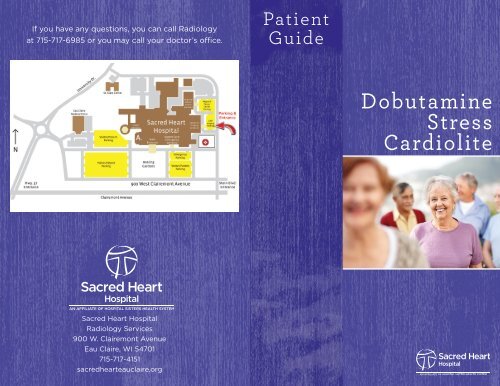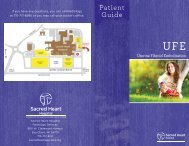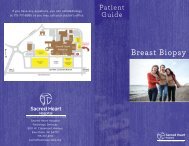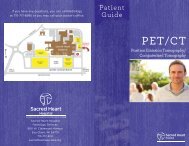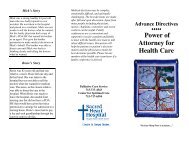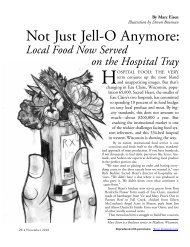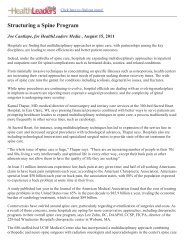Dobutamine Stress Cardiolite - Sacred Heart Hospital
Dobutamine Stress Cardiolite - Sacred Heart Hospital
Dobutamine Stress Cardiolite - Sacred Heart Hospital
Create successful ePaper yourself
Turn your PDF publications into a flip-book with our unique Google optimized e-Paper software.
If you have any questions, you can call Radiology<br />
at 715-717-6985 or you may call your doctor’s office.<br />
Patient<br />
Guide<br />
<strong>Dobutamine</strong><br />
<strong>Stress</strong><br />
<strong>Cardiolite</strong><br />
<strong>Sacred</strong> <strong>Heart</strong> <strong>Hospital</strong><br />
Radiology Services<br />
900 W. Clairemont Avenue<br />
Eau Claire, WI 54701<br />
715-717-4151<br />
sacredhearteauclaire.org
<strong>Dobutamine</strong> <strong>Stress</strong> <strong>Cardiolite</strong><br />
A dobutamine stress cardiolite is a way for a person to have a stress<br />
test if they can’t walk on a treadmill or ride a bicycle.<br />
The usual reasons for having this test are:<br />
• To check for any major blockage of blood flow to the heart muscle.<br />
• To check your heart before surgery.<br />
Before the Test<br />
• Do not eat or drink for 6 hours before your test, unless told by<br />
your doctor.<br />
• Medicines that are called BetaBlockers and medicines that have<br />
Nitroglycerin in them must not be taken for 24 hours before this<br />
test. If you are not sure, check with your doctor.<br />
• Because we want to speed up your heart rate during the test,<br />
talk to your doctor if you take any medicine that slows down<br />
your heart rate.<br />
• You may take your medicines with a sip of water unless your<br />
doctor tells you not to.<br />
• Bring your medicines and/or medicine list with you.<br />
• Come to the hospital 15 minutes before your scheduled test time.<br />
• Plan to be at the hospital 3-4 hours for the test. Please contact the<br />
nuclear medicine department if you are pregnant or nursing<br />
at 715-717-4151.<br />
Before the <strong>Stress</strong> Portion of the Test<br />
• When you arrive, the test will be explained to you. You can ask any<br />
questions you have about the test, its risks, or how it will be done.<br />
Once your questions have been answered, you will sign a consent<br />
form for the test.<br />
• An IV will be started through a vein in your hand or arm. A radioactive<br />
substance (tracer) will be put into the IV. It is a very small, safe<br />
amount that has no side effects and leaves your body quickly.<br />
• You will then be asked to sit in the waiting area for up to one hour<br />
so the tracer can travel through your blood to your heart.<br />
• The person doing the test (technologist) will then take pictures of<br />
your heart. This does not hurt, but you will need to lie still on your<br />
back for up to 20 minutes at a time.<br />
During the <strong>Stress</strong> Portion of the Test<br />
• After the first pictures are taken, you will be taken to a room and<br />
connected to a heart monitor (EKG) that will record how your heart<br />
is doing during the test. Your blood pressure will also be taken<br />
during the test.<br />
• A heart doctor (cardiologist) will be there when the medicine that<br />
increases your heart rate is slowly put into your IV. While you are<br />
receiving the medicine, you may feel your heart beating harder or<br />
faster, and chest pain may occur. You may also get a headache or<br />
feel sick. This will go away in a few minutes after the medicine is<br />
stopped.<br />
•The doctor or nurse will check your heart monitor, blood pressure,<br />
and ask how you are feeling.<br />
After the <strong>Stress</strong> Test<br />
A nurse will watch your heart and blood pressure until you are<br />
removed from the EKG and your IV taken out. A second set of<br />
pictures will be taken about 15-30 minutes after your stress test.<br />
Unless told by the nurse or doctor, you can return to your normal<br />
routine after your test. Your doctor will have the test results for<br />
you in 2-3 days.


